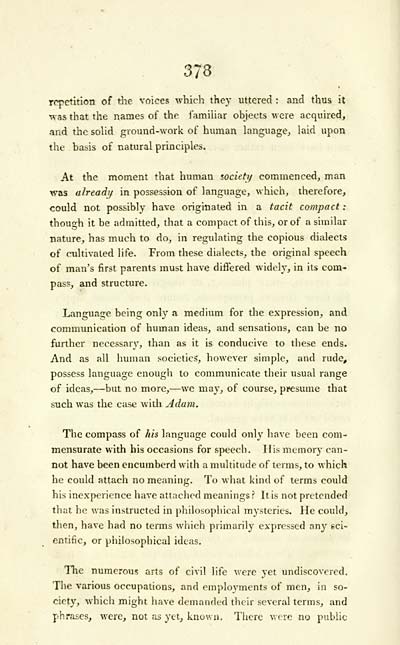Blair Collection > Celtic researches, on the origin, traditions & language, of the ancient Britons
(472)
Download files
Complete book:
Individual page:
Thumbnail gallery: Grid view | List view

378
repetition of the voices \vhich they uttered : and thus it
was that the names of the famihar objects were acquired,
and the sohd ground-work of human language^ laid upon
the basis of natural principles.
At the moment that human societi/ commenced, man
was alrtady in possession of language, which, therefore,
could not possibly have originated in a tacit compact :
though it be admitted, that a compact of this, or of a similar
nature, has much to do, in regulating the copious dialects
of cultivated life. From these dialects, the original speech
of man's first parents must have differed widely, in its com•
pass, and structure.
Language being only a medium for the expression, and
communication of human ideas, and sensations, can be no
further necessary, than as it is conducive to these ends.
And as all human societies, however simple, and rude,
possess language enough to communicate their usual range
of ideas, — but no more, — we may, of course, presume that
such was the case witli Adam.
The compass of Ids language could only have been com-
mensurate with his occasions for speech. His memory can-
not have been encumberd with a multitude of terms, to which
he could attach no meaning. To what kind of terms could
his inexperience have attached meanings ? It is not pretended
that he was instructed in philosophical mysteries. He could,
then, have had no terms which primarily expressed any gci-
enrific, or philosophical ideas.
The numerous arts of civil life were yet undiscovered.
The various occupations, and employments of men, in so-
ciety, which might have demanded their several terms, and
phrases, were, not as yet, known. Tliere were no public
repetition of the voices \vhich they uttered : and thus it
was that the names of the famihar objects were acquired,
and the sohd ground-work of human language^ laid upon
the basis of natural principles.
At the moment that human societi/ commenced, man
was alrtady in possession of language, which, therefore,
could not possibly have originated in a tacit compact :
though it be admitted, that a compact of this, or of a similar
nature, has much to do, in regulating the copious dialects
of cultivated life. From these dialects, the original speech
of man's first parents must have differed widely, in its com•
pass, and structure.
Language being only a medium for the expression, and
communication of human ideas, and sensations, can be no
further necessary, than as it is conducive to these ends.
And as all human societies, however simple, and rude,
possess language enough to communicate their usual range
of ideas, — but no more, — we may, of course, presume that
such was the case witli Adam.
The compass of Ids language could only have been com-
mensurate with his occasions for speech. His memory can-
not have been encumberd with a multitude of terms, to which
he could attach no meaning. To what kind of terms could
his inexperience have attached meanings ? It is not pretended
that he was instructed in philosophical mysteries. He could,
then, have had no terms which primarily expressed any gci-
enrific, or philosophical ideas.
The numerous arts of civil life were yet undiscovered.
The various occupations, and employments of men, in so-
ciety, which might have demanded their several terms, and
phrases, were, not as yet, known. Tliere were no public
Set display mode to: Large image | Transcription
Images and transcriptions on this page, including medium image downloads, may be used under the Creative Commons Attribution 4.0 International Licence unless otherwise stated. ![]()
| Early Gaelic Book Collections > Blair Collection > Celtic researches, on the origin, traditions & language, of the ancient Britons > (472) |
|---|
| Permanent URL | https://digital.nls.uk/75769087 |
|---|
| Description | A selection of books from a collection of more than 500 titles, mostly on religious and literary topics. Also includes some material dealing with other Celtic languages and societies. Collection created towards the end of the 19th century by Lady Evelyn Stewart Murray. |
|---|
| Description | Selected items from five 'Special and Named Printed Collections'. Includes books in Gaelic and other Celtic languages, works about the Gaels, their languages, literature, culture and history. |
|---|

